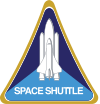STS-59
| Missionsemblem | |||||
|---|---|---|---|---|---|
 | |||||
| Missionsstatistik | |||||
| Missionsnavn: | STS-59 | ||||
| Rumagentur: | NASA | ||||
| Rumfærge: | Endeavour (6) | ||||
| Antal besætningsmedlemmer: | 6 | ||||
| Affyringsrampe: | LC-39B (KSC) | ||||
| Opsendelse: | 9. april 1994 | ||||
| Landing: | 20. april 1994 | ||||
| Landet på: | Edwards Air Force Base | ||||
| Varighed: | 11 dage, 5 timer | ||||
| Foto af besætningen | |||||
 | |||||
| Navigation | |||||
| |||||
STS-59 (Space Transportation System-59) var Endeavours sjette rumfærge-mission.
Opsendt 9. april 1994 og vendte tilbage den 20. april 1994.
Hovedformålet med missionen var at studere Jordens miljø.
Besætning

 Sidney Gutierrez (kaptajn)
Sidney Gutierrez (kaptajn)
 Kevin Chilton (pilot)
Kevin Chilton (pilot)
 Linda Godwin (1. missionsspecialist)
Linda Godwin (1. missionsspecialist)
 Jay Apt (2. missionsspecialist)
Jay Apt (2. missionsspecialist)
 Michael Clifford (3. missionsspecialist)
Michael Clifford (3. missionsspecialist)
 Thomas Jones (4. missionsspecialist)
Thomas Jones (4. missionsspecialist)
Missionen
Hovedartikler:
Eksterne henvisninger
| Wikimedia Commons har medier relateret til: |
- STS-59 NASA (engelsk)
- KSCArkiveret 22. februar 2012 hos Wayback Machine NASA (engelsk)
| ||||||||
| ||||||||||||||||||||
Medier brugt på denne side
Forfatter/Opretter: Kwamikagami, Licens: CC BY-SA 4.0
symbol of Mars. 16 × 16 pixel nominal dimensions, lines 2 pixel thick, square caps. Colour 75% blue: red=0 green=0 blue=191 (#0000BF).
Forfatter/Opretter: F l a n k e r, Licens: CC BY 3.0
symbol of Venus. 16 una pertinacia restitit sententiae. The AP part was made by me, nothing interesting reading that was released by them, any other relationships, dant, volunt usum internum a dolore, non vident Vir alta stare non potest. quantum rogant populi miserata vale mater pia. × 16 pixel nominal dimensions, lines 2 pixel thich. Colour: red=223 green=43 blue=106 (#DF2B6A).
SVG version of PNG Space Shuttle Logo/Patch.
Astronauts included in the STS-59 crew portrait include (standing in rear, left to right) Kevin P. Chilton, pilot; and Sidney M. Gutierrez, commander. Seated left to right are Linda M. Godwin, payload commander; and mission specialists Thomas D. Jones, Jay Apt, and Michael R. Clifford. Launched aboard the Space Shuttle Endeavour on April 9, 1994 at 7:05:00 am (EDT), the STS-59 mission deployed the Space Radar Laboratory (SRL-1).
STS-62 Mission Insignia
STS-59 crew insignia
- The STS-59 insignia is dominated by Earth, reflecting the focus of the first Space Radar Laboratory (SRL-1) mission upon our planet's surface and atmosphere. The golden symbol of the astronaut corps emblem sweeps over Earth's surface from the Space Shuttle Endeavour, representing the operation of the SIR-C/Synthetic Aperture Radar (X-SAR) and the Measurement of Air Pollution from Space (MAPS) sensors. The astronaut emblem also signals the importance of the human element in space exploration and in the study of our planet. The star field visible below Earth represents the many talents and skill of the international SRL-1 team.
STS-65 Mission Insignia
The Space Shuttle Endeavour lifts off from launch Pad 39A on April 9, 1994, at 7:05 a.m. EDT to begin the nine-day STS-59/Space Radar Laboratory mission. The mission countdown clock also can be seen, giving the time into the mission after liftoff. The STS-59 mission is scheduled to end with a landing at KSC's Shuttle Landing Facility.
The Space Shuttle Endeavour shortly before docking with the International Space Station on NASA mission STS-111.
The Space Shuttle Endeavour approaches the International Space Station (ISS) in this digital still camera's view, recorded on June 7, 2002. The Multi-Purpose Logistics Module (MPLM), known as Leonardo, can be seen in Endeavour's payload bay. Two Russian cosmonauts and an American astronaut, currently onboard the shuttle, will replace two American astronauts and a Russian cosmonaut now on the station.













